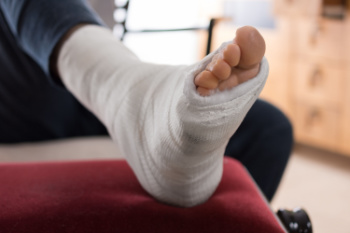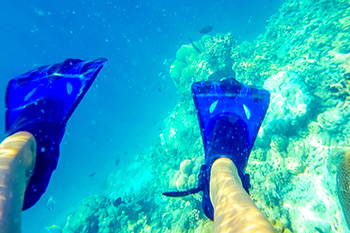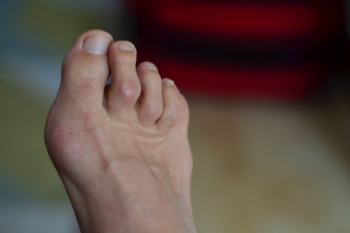
A Lisfranc foot injury involves damage to the midfoot, specifically the Lisfranc joint, which connects the forefoot and the arch. This injury can occur from a direct blow to the foot or from twisting or falling, leading to fractures or ligament tears. Symptoms of a Lisfranc injury include swelling, bruising, and significant pain in the midfoot, often exacerbated by standing or walking. The top of the foot may appear swollen, and there can be difficulty bearing weight. Misdiagnosis or delayed treatment can lead to chronic pain and instability. Prompt medical attention from a podiatrist is critical for an accurate diagnosis and an effective treatment plan, which may include immobilization or surgery to ensure proper healing and restore function to the affected foot. If you have this type of foot fracture, it is suggested that you are under the care of this type of doctor who can offer you the best treatment solution.
A broken foot requires immediate medical attention and treatment. If you need your feet checked, contact Corinne R. Kauderer, DPM from Dyker Heights Foot & Ankle. Our doctor can provide the care you need to keep you pain-free and on your feet.
Broken Foot Causes, Symptoms, and Treatment
A broken foot is caused by one of the bones in the foot typically breaking when bended, crushed, or stretched beyond its natural capabilities. Usually the location of the fracture indicates how the break occurred, whether it was through an object, fall, or any other type of injury.
Common Symptoms of Broken Feet:
- Bruising
- Pain
- Redness
- Swelling
- Blue in color
- Numbness
- Cold
- Misshapen
- Cuts
- Deformities
Those that suspect they have a broken foot shoot seek urgent medical attention where a medical professional could diagnose the severity.
Treatment for broken bones varies depending on the cause, severity and location. Some will require the use of splints, casts or crutches while others could even involve surgery to repair the broken bones. Personal care includes the use of ice and keeping the foot stabilized and elevated.
If you have any questions please feel free to contact one of our offices located in Brooklyn, NY and Old Bridge, NJ . We offer the newest diagnostic and treatment technologies for all your foot and ankle needs.

Divers should be wary of a condition known as fin foot, causing swollen and tender feet after diving, often exacerbated in cold or rough waters. The discomfort of fin foot stems from reduced blood flow to the feet, due to factors like improper fin techniques or ill-fitting gear. Symptoms of fin foot can include swelling, redness, bruising to the toes, and pain while walking. Experts suggest that a diver experiencing these symptoms immediately cease diving, elevate their feet, and apply a warm compress for relief. Symptoms that persist beyond 48 hours warrant consultation with a podiatrist. Collaborating with a podiatrist ensures proper gear fit, including booties and fin straps. Adjustments, such as using larger booties or spring straps, can reduce the risk of recurrence. While edema in fin foot does not necessarily signify decompression sickness, divers are wise to remain vigilant to its effects. If you are experiencing post-dive foot problems, it is suggested that you schedule an appointment with a podiatrist.
Sports related foot and ankle injuries require proper treatment before players can go back to their regular routines. For more information, contact Corinne R. Kauderer, DPM of Dyker Heights Foot & Ankle. Our doctor can provide the care you need to keep you pain-free and on your feet.
Sports Related Foot and Ankle Injuries
Foot and ankle injuries are a common occurrence when it comes to athletes of any sport. While many athletes dismiss the initial aches and pains, the truth is that ignoring potential foot and ankle injuries can lead to serious problems. As athletes continue to place pressure and strain the area further, a mild injury can turn into something as serious as a rupture and may lead to a permanent disability. There are many factors that contribute to sports related foot and ankle injuries, which include failure to warm up properly, not providing support or wearing bad footwear. Common injuries and conditions athletes face, including:
- Plantar Fasciitis
- Plantar Fasciosis
- Achilles Tendinitis
- Achilles Tendon Rupture
- Ankle Sprains
Sports related injuries are commonly treated using the RICE method. This includes rest, applying ice to the injured area, compression and elevating the ankle. More serious sprains and injuries may require surgery, which could include arthroscopic and reconstructive surgery. Rehabilitation and therapy may also be required in order to get any recovering athlete to become fully functional again. Any unusual aches and pains an athlete sustains must be evaluated by a licensed, reputable medical professional.
If you have any questions please feel free to contact one of our offices located in Brooklyn, NY and Old Bridge, NJ . We offer the newest diagnostic and treatment technologies for all your foot and ankle needs.
 Hammertoe is a deformity causing one or more of the smaller toes to bend abnormally at the middle joint, resembling a hammer. This condition arises primarily due to muscle imbalances that lead to increased pressure on the tendons and joints of the toe. Common causes include wearing ill-fitting shoes, particularly those that are too tight or have high heels, as well as genetic predispositions and conditions like arthritis. Symptoms of hammertoe include pain or irritation while wearing shoes, corns and calluses on the toe, redness and swelling, and in severe cases, open sores. The affected toe may become rigid over time, making movement difficult and painful. Preventing hammertoe involves wearing properly fitting shoes with adequate toe room, avoiding high heels, and performing toe-stretching exercises to maintain flexibility. Early intervention is key to managing the condition effectively. Treatment options range from non-surgical methods, such as wearing custom orthotic devices, using padding to reduce pressure, and taking anti-inflammatory medications, to surgical procedures for severe cases where the toe has become rigid. Surgery typically involves realigning the toe and correcting the deformity. Complications of untreated hammertoe can include chronic pain, difficulty in walking, and persistent sores or infections, which can lead to further foot problems. If you have an uncomfortable hammertoe, it is suggested that you visit a podiatrist for an accurate diagnosis and a tailored treatment plan.
Hammertoe is a deformity causing one or more of the smaller toes to bend abnormally at the middle joint, resembling a hammer. This condition arises primarily due to muscle imbalances that lead to increased pressure on the tendons and joints of the toe. Common causes include wearing ill-fitting shoes, particularly those that are too tight or have high heels, as well as genetic predispositions and conditions like arthritis. Symptoms of hammertoe include pain or irritation while wearing shoes, corns and calluses on the toe, redness and swelling, and in severe cases, open sores. The affected toe may become rigid over time, making movement difficult and painful. Preventing hammertoe involves wearing properly fitting shoes with adequate toe room, avoiding high heels, and performing toe-stretching exercises to maintain flexibility. Early intervention is key to managing the condition effectively. Treatment options range from non-surgical methods, such as wearing custom orthotic devices, using padding to reduce pressure, and taking anti-inflammatory medications, to surgical procedures for severe cases where the toe has become rigid. Surgery typically involves realigning the toe and correcting the deformity. Complications of untreated hammertoe can include chronic pain, difficulty in walking, and persistent sores or infections, which can lead to further foot problems. If you have an uncomfortable hammertoe, it is suggested that you visit a podiatrist for an accurate diagnosis and a tailored treatment plan.
Hammertoe
Hammertoes can be a painful condition to live with. For more information, contact Corinne R. Kauderer, DPM from Dyker Heights Foot & Ankle. Our doctor will answer any of your foot- and ankle-related questions.
Hammertoe is a foot deformity that affects the joints of the second, third, fourth, or fifth toes of your feet. It is a painful foot condition in which these toes curl and arch up, which can often lead to pain when wearing footwear.
Symptoms
- Pain in the affected toes
- Development of corns or calluses due to friction
- Inflammation
- Redness
- Contracture of the toes
Causes
Genetics – People who are genetically predisposed to hammertoe are often more susceptible
Arthritis – Because arthritis affects the joints in your toes, further deformities stemming from arthritis can occur
Trauma – Direct trauma to the toes could potentially lead to hammertoe
Ill-fitting shoes – Undue pressure on the front of the toes from ill-fitting shoes can potentially lead to the development of hammertoe
Treatment
Orthotics – Custom made inserts can be used to help relieve pressure placed on the toes and therefore relieve some of the pain associated with it
Medications – Oral medications such as anti-inflammatories or NSAIDs could be used to treat the pain and inflammation hammertoes causes. Injections of corticosteroids are also sometimes used
Surgery – In more severe cases where the hammertoes have become more rigid, foot surgery is a potential option
If you have any questions please contact one of our offices located in Brooklyn, NY and Old Bridge, NJ . We offer the newest diagnostic and treatment technologies for all your foot and ankle needs.








